TONY MAY’S DAUGHTER, DISCIPLE, AND PARTNER
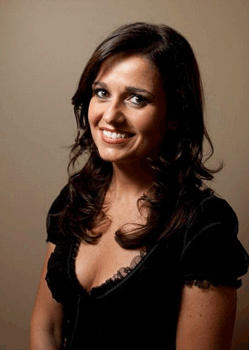
Marisa May, photo by Caplin
text ©2011
I always begin my interviews with “food people” with the question: what are your earliest memories of food?
MM: Pastina in brodo, which is still one of my favorite dishes, and nutella spread on bread. We’d bring jars of it back from Italy because, when I was little, nutella didn’t exist here.
Then, when I was a little bit older, probably my grandmother’s cooking in Naples. As a child and even later I spent every summer in Italy: Naples, Capri, Sorrento, the Amalfi Coast. I still have my grandmother, several aunts, uncles, and cousins there.
Probably though my first memories of food in Italy are of tasting foods I’d not experienced yet in the United States. So I remember eating sea urchin, figs, eel, and white truffles. I remember my Dad saying “Marisa, even if you don’t like a food at first, you have to taste it to understand how good it is.” He was right, because later I acquired a taste for all these delicious foods. I was five or six then.
Other first food memories are again with my father. I’m a child of the Italian food industry so I grew up in the kitchens of all the different restaurants that my Dad has owned. When I was born my Dad owned “The Rainbow Room.” I remember running through the kitchen there and the chef would always pluck food and make me taste it.
What’s your first memory of eating at a restaurant?
MM: In “The Rainbow Room.” Yes, 100%. The chef was a crazy Italian. I’d like to say that his name was Fausto, but I’m not sure; I’ll have to double check. No, actually his name was Quinto Piano. Even then I was thinking: “What a glamorous business! I could run around the kitchen and get fed. Everyone would know who I was.” I was a big shot at three-years-old running around the kitchen of “The Rainbow Room.”
Did your Mom work at “The Rainbow Room”?
MM: No, she gave up her career in business to take care of me; I’m an only child. I think she’d been the assistant to the president of Pfizer. However, my father hosted so many events that she, too, was always at “The Rainbow Room.” She died when I was 18.
Even though you’re Tony May’s daughter, you’ve learned the restaurant business from the ground up working at his several restaurants; do you agree that that’s the best training?
MM: I really had to prove myself. No. 1, I was a woman in this industry and most of these family teams are fathers-and-sons. We stood out and are unique in this way. It was definitely more challenging for me because I was a woman working with my father.
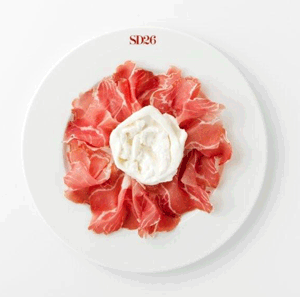 Yes, indeed I would agree that working from the ground up is the only way to learn. It’s the best kind of training. You have to know all aspects of the restaurant business. It’s not just one area. I remember my Dad used to put me in the kitchen during the summers when I was younger and I’d make the pastas and the breads by hand. I used to get blisters on my fingers and flour in my hair, and then I’d have to work the dining room floor. I realized that I really couldn’t do both — work in the kitchen and run the dining room. I really loved and still love to cook, but I didn’t like to cook under pressure. I loved the dining room floor because I grew up loving the musical theater, singing and acting; I did a lot of amateur singing and acting, so the floor just seemed like the right place for me. I love people. I love to talk about food. I love the theatrics of food and restaurants. Never a dull moment, very ad-lib! Every night was and is always a different show.
Yes, indeed I would agree that working from the ground up is the only way to learn. It’s the best kind of training. You have to know all aspects of the restaurant business. It’s not just one area. I remember my Dad used to put me in the kitchen during the summers when I was younger and I’d make the pastas and the breads by hand. I used to get blisters on my fingers and flour in my hair, and then I’d have to work the dining room floor. I realized that I really couldn’t do both — work in the kitchen and run the dining room. I really loved and still love to cook, but I didn’t like to cook under pressure. I loved the dining room floor because I grew up loving the musical theater, singing and acting; I did a lot of amateur singing and acting, so the floor just seemed like the right place for me. I love people. I love to talk about food. I love the theatrics of food and restaurants. Never a dull moment, very ad-lib! Every night was and is always a different show.
Have you worked in restaurants that weren’t your father’s?
MM: No, never. I’m my father’s only child, and always being part of his team was a good way for him to keep his eye on me. He’s still an Italian father watching over his only daughter.
Your first memories of your father?
MM: Growing up in the restaurant business with my Dad who was working all the time. He was also the oldest of eight children. I remember he had to take care of his parents in Naples, all my aunts and uncles, and my cousins. I knew that he was making sacrifices for us and for the family, but mornings and Sundays were very important family time. Our summers in Italy were also very important. I remember my Dad would take a month off, the month of August, so we would go to Italy.
Sunday was our family day. I also remember spending mornings with my Dad when I was still too young to go to school. One of the first things I remember about my Dad was his teaching me how to cook. The first thing I had to learn was eggs, frittata or omelets, and puttanesca sauce: garlic, peperoncino flakes, anchovies, Gaeta olives, and capers. He’s a good cook.
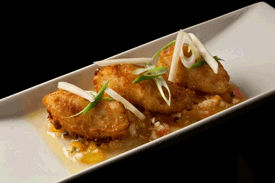 |
|
Zeppola di Baccala
|
What do you think are the essential qualities for becoming a top restaurateur?
MM: Definitely sacrifice, commitment, and patience. You always have to be one step ahead of the game because it’s such a competitive business. You have to watch your numbers. You have to treat every customer in the dining room as if he or she was a VIP. What’s important to us restaurateurs is that we somehow touch the lives of every person in our dining room. What makes a customer return is some sort of connection with us. Our dining room is our living room. It’s our first home. We really want everyone to feel welcome as if they were walking into our home. You need a lot of dedication. You also have to be a little kooky to work these long hours. You need a sense of humor. We laugh a lot in this business.
It says in your bio on San Domenico’s website that your father sent you to Italy every summer to a different region every time. How old were you then and where did you go?
MM: I think I traveled with him to almost every region. Sometimes I’d take one of the GRI (Gruppo ristoratori italiani) study tours he’d organize. The first region I really studied, maybe I was about eleven or twelve, was Puglia. I also went on GRI tours to Piemonte and to Friuli. There I remember all these great vineyards.
I often wonder what would have happened if I’d stayed and worked in one of the many restaurants we visited on these tours in Italy, but I never really wanted to. I’ve never worked in Italy but I’m so spoiled because my father has so many friends. Every time I’d go into one of these Michelin-starred restaurants or the top cantine I’d be treated like a princess. It was really important for me to have experienced the warmth of Italian hospitality and understood Italian products. These GRI tours were fabulous learning experiences. I was really lucky that I could experience everything so first-class. Afterwards I’d always run off to Capri with my Italian cousins and friends.
Besides Italy, my father sent me to the south of France and Montecarlo to Alain Ducasse. Wow! That was my first WOW experience of what fine dining was. It was important that I learn the meaning of European hospitality.
Do you have a favorite Italian region or two?
MM: I love all regions of Italy, but obviously sentimentally and emotionally my heart is really in Campania. The people there live on the edge of Vesuvius and they live every day as if it’s their last one. They’re happy-go-lucky; the food is wonderful. There’s really no region that I don’t love in Italy. They are all so different.
You are an only child; did you ever want a sibling?
MM: I sure did. I told my Dad that I needed ten brothers so that I could at least have a night off once in a while. I wouldn’t have minded to have sisters too, but I’ve always enjoyed being the princess.
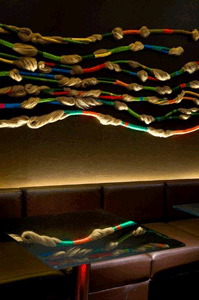
Wall art at SD26
You’ve worked side-by-side with your father all your life. Can you tell my readers a bit more about Tony May and how you divide the responsibilities at “SD26”?
MM: My Dad has always promoted me as the face, the personality, the hostess of our restaurants. That’s why, when I started out, I was always at the front door of the old “San Domenico.” I took all the reservations; greeted our guests on arrival and said “goodnight” to them when they left. I didn’t really have to worry so much there about service, although I was in every staff meeting, so I could learn about service. We, of course, always had a maître d’ and a manager on the floor, but I was always learning management.
Here, instead, I run all the staff meetings, watch all the numbers with my father and work with the comptroller, and help with the tastings and menu-planning. We’re definitely 50/50 here. We are co-owners so I definitely am more involved in some departments than at the old “San Domenico.” My Dad shares everything with me. We’re very honest and open with each other. There are no secrets. We compromise sometimes; sometimes we don’t. We both have very strong personalities. Both of us are very fiery. I’m a Leo and my father’s a Sagittarius. Both of us have very strong views. I’m definitely Tony May’s daughter. I was definitely modeled that way, but I do have my own independent way of thinking too. Maybe I have a more feminine approach, so I have more patience than my Dad; also because I’m younger, but he’s very modern in his thinking, so we really don’t clash too much. My Dad is very cool for his age. He learns from young people. In most cases he’s very open-minded. All the new technologies at “SD26” actually started with him. I just had to approve them.
It’s not easy to work with a parent; what’s your secret?
MM: We get along really well and usually agree on all the important decisions for “SD26.” We’re definitely on the same wave-length, same team, 100%.
What language do you speak to each other?
MM: Both English and Italian depending on who we’re with. I also speak some French.
You said in an interview that your “father invited all our Michelin-starred chefs to come and try the recipes for ‘SD26’.” Who were they?
MM: Gennaro Esposito, Don Alfonso Iaccarino, Daniel Sandoli, from “Il Buco” in Sorrento, Massimo Bottura.
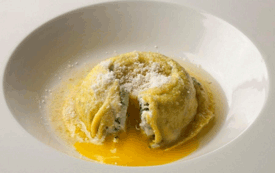 |
|
Egg in ravioli with truffle butter
|
What are SD 26’s signature dishes?
MM: Our trademark dish is uovo in ravioli con burro tartufato (the homemade soft egg yolk, ricotta and spinach-filled ravioli with truffle butter). Other signature dishes include: linguine di Gragnano with clams, grape tomatoes, and parsley, smoked with apple wood; spaghetti alla chitarra with tomato and basil; whole wheat fettucine with coriander scented lamb ragu, fava beans, and fresh mint; zeppole di baccala (salt cod fritters), apples, and scallions agrodolci; Canaroli risotto with periwinkles, lemon, and extra virgin olive oil; olive-oil poached cod fish, dry martini sauce, heirloom carrots, and spring onion; and pan-seared squab, braised Casteluccio lentils, grapes, and fired sage.
Your personal favorites on the menu?
MM: I’m a big fan of all our salumi and salami. I also love our homemade pasta, especially our fettucine with wild boar and our “uovo” or soft egg-yolk filled ravioli with truffled butter, our scallop saltimbocca, beef cheeks, and the baby goat.
Your father’s favorites?
MM: Tripe, spaghetti with sea urchin sauce, suckling pig, and the baby goat.
My friend and yours, Michelle Scicolone, the cookbook writer, told me you had a cheese on your menu that no one else in New York has. What cheese?
MM: Strachitunt, a fresh cow’s-milk cheese from Lombardy.
What do you like the most about your work?
MM: I love my job because every day is such a challenge. No two days are alike. You never know what’s going to happen next in the restaurant business. I also love to interact with people. I love making people happy. This is what we do here. We try to bring our customers into a different world. This is our little piece of Italy so we want to whisk them off to Italy for a few hours so they forget their problems and they forget their fears, so they can think about making memories at the table with family or with friends. Maybe they’re making the greatest business deal of their life. We hope that every time our customers come in, it’s a special occasion for them, that we are part of it and that we add to it, that we touch them in some way.
The least?
MM: What is really hard, and part of this is being a woman, is the lack of free time. As I woman I need my beauty time, my family time, my personal time. It’s hard because I have to work on holidays. We have to work late sometimes. I remember that growing up I could never get to a party on time; I always arrived late. Balance is what’s really hard in this industry. Years ago I think that people were more willing to make a sacrifice. Now there’s is so much that we want to do in life. I think that it is important that you do take personal time as a woman, with family, with children. You have to make sure, too, that you hire the right people and pay them well so that when you’re not around those few hours that you have someone very competent who can represent you. You have to learn how to take care of yourself and make sure that you take care of the people around you whom you love, because otherwise it’s very easy to get lost in the everyday operations of the restaurant business, because it’s just one thing after another and time flies. Before you know it, you’ve been here from 9 o’clock in the morning and it’s already 2 o’clock the next day by the time you leave.
Other restaurateurs that you admire?
MM: In New York City Danny Meyer; I grew up with the Maccioni boys, Sirio and Egidiana’s three sons, Mario, Marco and Mauro. I know how hard they’ve worked all their lives at “Le Cirque;” Cesare Casella, who is very dedicated to authenticity. He helped to launch New York’s Italian Culinary Academy in 2006 and his newest restaurant, opened in 2008, is “Salumeria Rosi.” Otherwise, when it comes to non-Italians, I’m a huge fan of Alain Ducasse. I love a lot of restaurateurs. It’s really hard for me to choose. I grew up with a lot of them. I admire many young restaurateur/chefs like Yann de Rochefort at “Boqueria” Alain Alegretti’s “Alegretti.”
Restaurants in New York that you like to go to?
MM: I love “Sandro’s” for its Roman cuisine; Cesare Casella’s “Salumeria Rosi”; “Boqueria”; “Le Cirque”; “Alegretti” but it’s closed now because chef/owner Alain Alegretti is moving locations; for fish I like “Mylos” very much, too.
Restaurants in Italy that you like to go to?
MM: “Don Alfonso,” “Osteria Francescana” in Modena, and in Capri “La Fontelina.” It’s the restaurant on the beach in Capri.
You studied voice; what are your favorite operas?
MM: First of all “La Boheme,” then “La Traviata,” and “Rigoletto.” Luciano Pavarotti was such a dear friend of ours, so for me this question is very nostalgic because all the operas I’ve ever seen were always with Pavarotti. He was extremely close to my father. He spent holidays at my house. We catered every one of his parties. This is a watercolor by him — a gift to my Dad. He painted behind the scenes. Pavarotti was probably my most favorite customer of all time.
Can you tell me an anecdote about Pavarotti?
MM: He was very witty and funny. He was a storyteller. He was very charming and always a psychic. He told me funny things about myself that even I didn’t know. For example, he told me: “Marisa, I know that there are going to be three men in your life: your father, your husband, and your lover.” That was his sense of humor. He loved to eat and his joy in life was at the table. He was such a “foodie” like my father. They would sit and talk about food and cooking for hours. One thing I remember about his taste in food, one thing that he always asked for that we didn’t make was Häagen-Dazs vanilla ice cream at the end of his dinner.
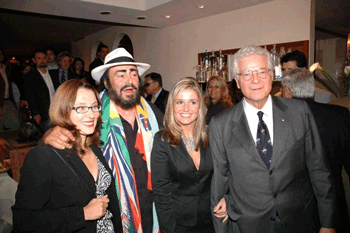 Nicoletta and Luciano Pavarotti with Marisa and Tony May |
|
Nicoletta and Luciano Pavarotti with Marisa and Tony May
|
What was his favorite dish that you did make?
MM: Spaghetti alla chitarra with tomato and basil, risotto parmigiano, la bistecca alla fiorentina marinated in rosemary, sage, and olio d’oliva extra-vergine, and panna cotta.
If you hadn’t become a restaurateur, what profession would you have chosen?
MM: I would have loved to have been a star in a musical show on Broadway because I love singing and acting so much in a Kristin Chenoweth role.
My favorite Broadway musical is “Annie.” When I was in high school I was the star in a production of “Annie.” I played Annie in “Annie” so my dream came true but just not on Broadway.
& & &
Back to Tony May, click here
